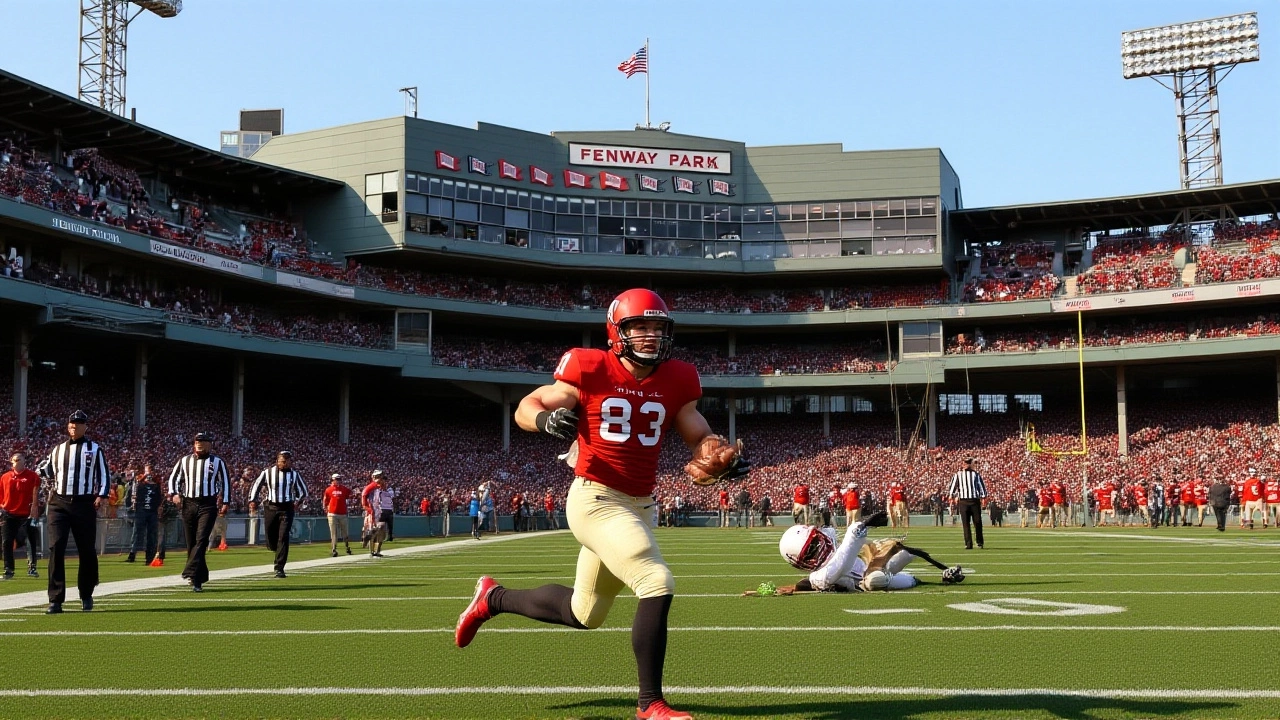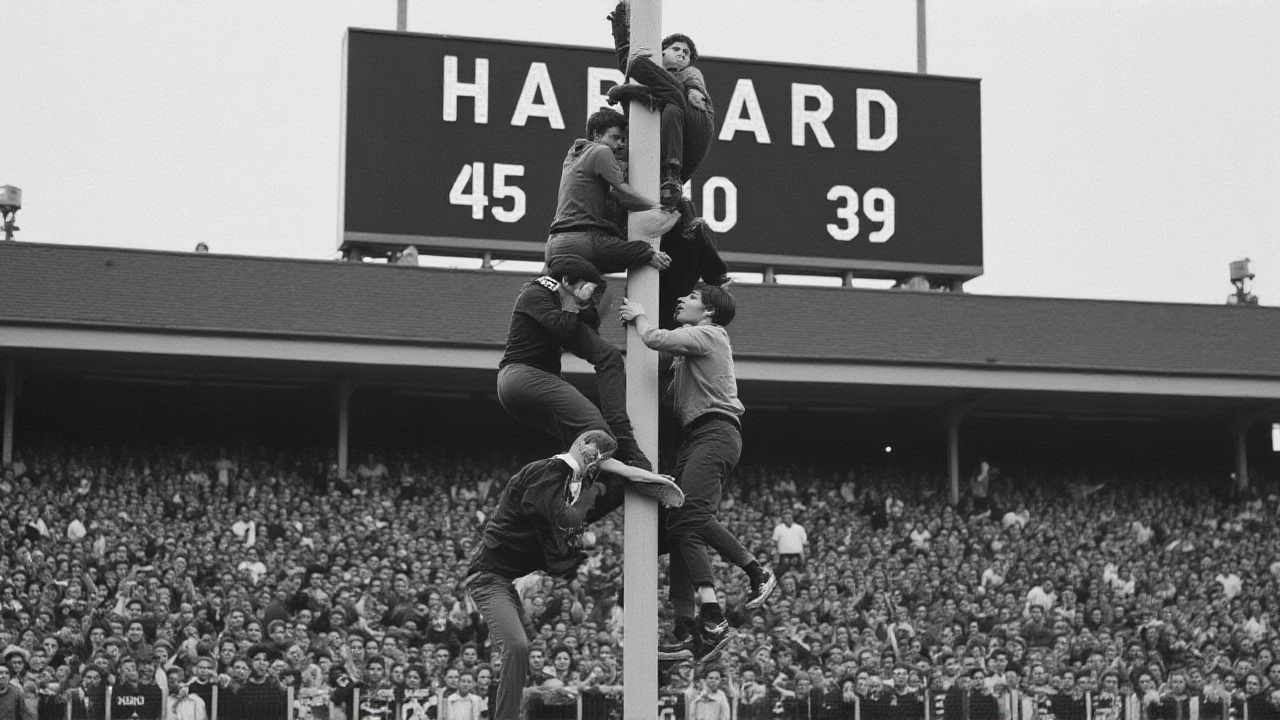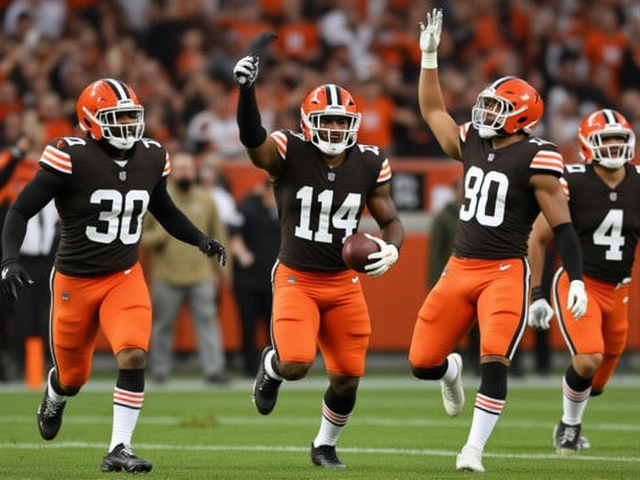It wasn't just a win. It was a seismic shift. On November 22, 2025, at the Yale Bowl in New Haven, Connecticut, the Yale Bulldogs dismantled the previously undefeated Harvard Crimson 45-28 in the 141st edition of The GameYale Bowl, ending Harvard’s nine-game winning streak and handing the Crimson their first loss of the season. The victory didn’t just lift Yale to a share of the Ivy League title — it delivered the conference’s first-ever automatic bid to the NCAA Division I FCS playoffs, rewriting 70 years of tradition in under three hours.
The Opening Blow That Changed Everything
Twelve seconds into the game, Harvard’s hopes began to unravel. Senior quarterback Jaden Craig threw his first pass from his own 15-yard line — and it was stripped by Yale defensive back Brandon Webster. The fumble recovery was returned to the Harvard 30. Eighteen seconds later, Yale quarterback Dante Reno hit wide receiver Jaxton Santiago on a 21-yard touchdown. The crowd, packed with 35,000 fans at the historic Yale Bowl, erupted. Harvard hadn’t just lost momentum — they’d lost their rhythm before they’d even settled in.
By the time Noah Piper nailed a 40-yard field goal with 6:12 left in the first quarter, Yale led 10-0. Then came Josh Pitsenberger. The Bulldogs’ running back, who’d finished the season with 1,247 rushing yards, turned a routine handoff into a statement: an 8-yard burst into the end zone, making it 17-0. Harvard’s offense, which had averaged 38 points per game this season, looked disjointed. And the worst part? They were still down by three scores when the clock hit zero in the first half.
Halftime: A Decision That Defined the Game
With three seconds left before halftime, Yale faced 4th and goal from the Harvard one-yard line. Most teams kick. Most teams play it safe. Yale didn’t. Head coach Tony Reno — in his 10th season — signaled for the run. Pitsenberger plunged through the line, bull-rushing two defenders into the end zone. The score: 31-14. No field goal. No margin for error. Just pure, unapologetic aggression.
"They came out there and they did everything that we had been doing for nine weeks," said Harvard head coach Andrew Aurich afterward. "What they did, that was really impressive." His tone wasn’t bitter. It was resigned. Like he’d watched a mirror image of his own team — sharper, hungrier, more ruthless.
The Second Half: Yale’s Offense, Harvard’s Desperation
Harvard fought back. Craig, who threw for 242 yards and rushed for 83, broke free for a 26-yard TD run late in the second quarter. Then, early in the third, he connected with Brady Blackburn on a 31-yard strike to make it 31-20. But Yale’s offense, led by Reno’s precise 22-of-29 passing (287 yards, 3 TDs), never blinked. A 12-yard touchdown pass to tight end Lucius Anderson in the fourth quarter pushed the lead to 45-20. The Crimson scored again on a final drive — another Craig-to-Blackburn connection — but the clock had already run out on their season.
When the final whistle blew, Yale fans poured onto the field. Not just a few. Dozens. Then hundreds. The Yale Bowl — built in 1914 and still one of the oldest college stadiums in the U.S. — became a sea of blue and white. Players hugged. Coaches cried. The weight of history was finally lifted.

A First in Ivy History
The Ivy League, founded in 1954 as an athletic conference, had never allowed its champion an automatic path to the FCS playoffs. That changed in 2025. The league’s board voted in April to grant the regular-season co-champion the bid — a decision that felt symbolic until Saturday. Now, it’s historic. With the win, Yale Bulldogs (8-2, 6-1 Ivy League) claimed the automatic berth. Harvard (9-1, 6-1 Ivy League) shares the title — but their postseason fate hangs in the balance.
"We await the FCS selection committee’s final decision," confirmed Erin McDermott, Harvard’s athletic director. "We know we’re one of the best teams in the FCS. But we also know we didn’t earn the automatic spot. That’s on us."
What This Means for Harvard’s Class of 2026
For the first time since 1947, Harvard’s Class of 2026 has never won The Game. Four straight losses. Four years of watching Yale celebrate on their home field. The last time Harvard lost four in a row to Yale? The same year World War II ended. The last time Yale won four straight? Before the Vietnam War began.
Yale’s last Ivy title came in 2023 — a shortened season due to COVID-19. This one? Full schedule. Full pressure. Full redemption. And for Tony Reno? A decade of building culminated in a single Saturday.

What’s Next?
Yale will open FCS playoff action on November 29, 2025, as the Ivy League’s representative. The selection committee will announce the full 24-team bracket on Sunday, November 23. Harvard’s chances are slim but not zero — they’re ranked 21st in the FCS Top 25, and their strength of schedule is among the nation’s toughest. But without an automatic bid, they’re at the mercy of a committee that’s never had to choose between two teams from the same conference.
Meanwhile, Yale’s players will enjoy the moment. Pitsenberger’s three touchdowns. Reno’s clutch throws. Webster’s game-changing fumble. And the 35,000 fans who turned a 110-year-old stadium into a cathedral of college football history.
Frequently Asked Questions
Why is this the first time the Ivy League has an automatic playoff bid?
The Ivy League historically prioritized academics over postseason play and banned postseason football since the 1950s. In 2025, after years of pressure from players and alumni, the league voted to allow the regular-season champion to receive an automatic bid to the FCS playoffs — a move designed to increase competitiveness and national visibility without compromising academic standards.
How did Yale’s offense manage to dominate Harvard’s defense?
Yale’s offense averaged 34.6 points per game this season, but Saturday was different. They exploited Harvard’s aggressive secondary by using quick slants and play-action passes. Dante Reno completed 73% of his throws, and Josh Pitsenberger’s physical running style wore down Harvard’s front seven, who had allowed just 98 rushing yards per game entering the match.
What’s the significance of the Yale Bowl in this rivalry?
Opened in 1914, the Yale Bowl is the first stadium in the U.S. built in the bowl shape that inspired the Rose Bowl. It’s hosted every edition of The Game since 1921 — except for 1943 and 1944 during WWII. Saturday’s crowd of 35,000 was the largest since 2019, and the energy was described by ESPN as "the loudest it’s been since the 1980s."
Could Harvard still make the FCS playoffs without the automatic bid?
It’s possible, but unlikely. Harvard’s 9-1 record includes wins over Brown, Dartmouth, and Columbia — all solid teams — but they lost to Yale and were outscored by 17 points in that game. The FCS selection committee typically favors teams with at least one win over a top-10 opponent, and Harvard’s only loss was to the team now representing the conference. Their strength of schedule is strong, but they lack a signature win outside of the Ivy League.
How does this affect recruiting for both programs?
For Yale, this win signals a return to national relevance — especially with the FCS playoff berth. Recruits now see a clear path to postseason play without leaving the Ivy League. For Harvard, the loss may deter some top-tier athletes who prioritize playoff opportunities, though their academic prestige still draws elite students. Still, the message is clear: winning The Game now means more than ever — it’s the gateway to the national stage.
What’s the history behind Yale and Harvard’s rivalry?
First played in 1875, The Game is the oldest college football rivalry in the U.S. Yale leads the all-time series 62-54-8, but Harvard had dominated since 2016, winning 9 of 10 meetings. This loss ends Harvard’s longest winning streak in the series since 1947 — and gives Yale its longest winning streak since 1942-1947, when the country was at war. The emotional weight runs deeper than wins and losses.



